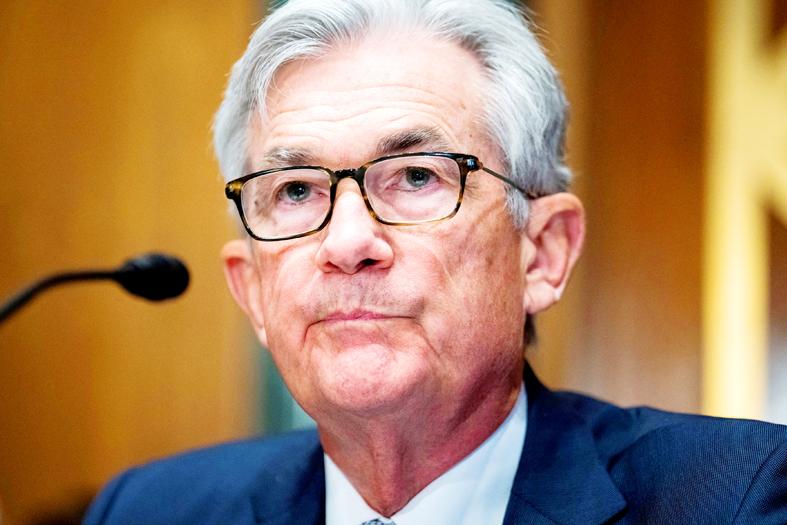The latest pickups in consumer prices and inflation expectations are expected to spur US Federal Reserve officials to consider the biggest interest-rate increase since 1994 when they meet this week, after Fed Chair Jerome Powell previously signaled a smaller move was the likely outcome.
US central bankers are to conclude a two-day meeting today, with a decision due at 2pm in Washington.
Powell indicated at his post-meeting news conference early last month that the Fed would move forward with half-point rate hikes this month and next month as long as economic data came in as expected.

Photo: Reuters
However, in the past few days, inflation figures have surprised to the high side, pushing investors to increase bets on a 75 basis-point increase at this week’s meeting, pricing in interest-rate futures shows.
That sentiment rose on Monday following a report in the Wall Street Journal suggesting the larger move was now in play.
Stocks extended a selloff in Asia yesterday after sinking into a bear market alongside a surge in bond yields.
MSCI’s broadest index of Asia-Pacific shares outside Japan fell 0.45 percent in volatile trade, clawing back some of its earlier losses.
Australia’s benchmark S&P/ASX200 closed 3.55 percent lower, while Japan’s Nikkei was down 1.32 percent, having fallen as much as 2 percent earlier in the session.
Economists at major Wall Street firms were quick to change their calls.
Goldman Sachs Group Inc and Nomura Holdings Inc shifted on Monday to forecast 75 basis-point hikes this week and at the Fed’s meeting late next month.
JPMorgan Chase & Co also went to 75 basis points at this week’s meeting, joining Barclays PLC and Jefferies, who modified their calls on Friday to the larger increase.
Powell and his colleagues, facing criticism for being slow to remove emergency stimulus prompted by the COVID-19 pandemic and allowing inflation to climb by the fastest pace in 40 years, have repeatedly said that they would do whatever it takes to cool prices.
Tactically, a 75 basis-point increase would be a communication shift for Powell, who has preferred to telegraph moves and embrace gradualism. That strategy has allowed the Fed to lean in to tighter policy, but let markets price the risk of going faster or slower as the data rolled in.
A 75 basis-point increase could boost credibility by showing that the Fed is serious about inflation.
However, it also risks confusing markets about what they do next.
“Once the Fed starts moving in 75s, it would be hard to stop, and the combination of this and the Fed’s outcome-based approach to inflation feels like it could be a recipe for recession,” Evercore ISI’s Krishna Guha and Peter Williams wrote in a note to clients.
A 75 basis-point move could also erode Fed credibility by underscoring how poor the Fed’s forecasting has been in the post-pandemic recovery.
This week’s meeting includes fresh forecasts for rates over the next couple of years.

RUN IT BACK: A succesful first project working with hyperscalers to design chips encouraged MediaTek to start a second project, aiming to hit stride in 2028 MediaTek Inc (聯發科), the world’s biggest smartphone chip supplier, yesterday said it is engaging a second hyperscaler to help design artificial intelligence (AI) accelerators used in data centers following a similar project expected to generate revenue streams soon. The first AI accelerator project is to bring in US$1 billion revenue next year and several billion US dollars more in 2027, MediaTek chief executive officer Rick Tsai (蔡力行) told a virtual investor conference yesterday. The second AI accelerator project is expected to contribute to revenue beginning in 2028, Tsai said. MediaTek yesterday raised its revenue forecast for the global AI accelerator used

TEMPORARY TRUCE: China has made concessions to ease rare earth trade controls, among others, while Washington holds fire on a 100% tariff on all Chinese goods China is effectively suspending implementation of additional export controls on rare earth metals and terminating investigations targeting US companies in the semiconductor supply chain, the White House announced. The White House on Saturday issued a fact sheet outlining some details of the trade pact agreed to earlier in the week by US President Donald Trump and Chinese President Xi Jinping (習近平) that aimed to ease tensions between the world’s two largest economies. Under the deal, China is to issue general licenses valid for exports of rare earths, gallium, germanium, antimony and graphite “for the benefit of US end users and their suppliers

Dutch chipmaker Nexperia BV’s China unit yesterday said that it had established sufficient inventories of finished goods and works-in-progress, and that its supply chain remained secure and stable after its parent halted wafer supplies. The Dutch company suspended supplies of wafers to its Chinese assembly plant a week ago, calling it “a direct consequence of the local management’s recent failure to comply with the agreed contractual payment terms,” Reuters reported on Friday last week. Its China unit called Nexperia’s suspension “unilateral” and “extremely irresponsible,” adding that the Dutch parent’s claim about contractual payment was “misleading and highly deceptive,” according to a statement

Artificial intelligence (AI) giant Nvidia Corp’s most advanced chips would be reserved for US companies and kept out of China and other countries, US President Donald Trump said. During an interview that aired on Sunday on CBS’ 60 Minutes program and in comments to reporters aboard Air Force One, Trump said only US customers should have access to the top-end Blackwell chips offered by Nvidia, the world’s most valuable company by market capitalization. “The most advanced, we will not let anybody have them other than the United States,” he told CBS, echoing remarks made earlier to reporters as he returned to Washington